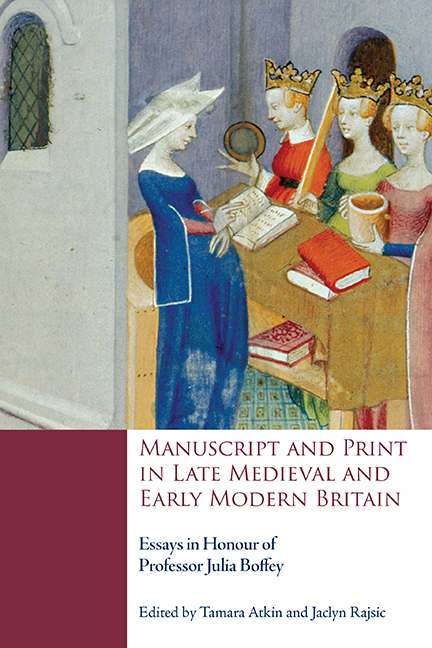 Manuscript and Print in Late Medieval and Early Modern Britain
Manuscript and Print in Late Medieval and Early Modern Britain Afterword
Published online by Cambridge University Press: 06 September 2019
Summary
WHEN JULIA ARR IVED IN YORK from Cambridge in 1977, she joined an already thriving body of graduate students working on medieval topics. Some had come to do the one-year interdisciplinary MA in Medieval Studies and an increasing number to embark directly on research for the D.Phil. York was thriving because it had a well-established and wellorganized Centre for Medieval Studies and a regular intake of well-qualified students to sustain it, in some measure because York is an attractive and extremely medieval city to live in, but above all because of the charismatic presence of Elizabeth Salter. She was the founder and inspiration of the Centre and its most brilliant teacher and research supervisor. No student who came into contact with her was not enriched for life by the experience.
The early cohorts of D.Phil. students mostly did the traditional medieval English subjects – Chaucer, Langland, the Mystery Plays, the English and French romances – but from about 1975 a change began to take place. It could be called ‘the manuscript turn’, and the development of Elizabeth Salter's own research had a lot to do with it. It was the time when the emphasis of postgraduate study and research turned from the literary value and textual status of medieval works to the material circumstances of their existence, the manuscripts, and what they had to tell us about literary history, book history, manuscript production, changes in taste and every aspect of cultural history. It was this cohort that Julia belonged to and to which she gave, by her presence at York, a special character and impetus. Her work was on the late-medieval English lyric, not for the purpose of evaluating its literary merit, nor establishing the text, nor putting it into categories of genre, but to study the manuscripts in which literary works had their only surviving existence. It was from that study that could be obtained understanding of how it came into being, who wrote it, how it was produced, copied, decorated, organized, circulated and to whom it appealed. The best way of doing this, as Julia demonstrated, was not to allow study to be governed by the questions that were already known, but to allow manuscripts to have their own say.
- Type
- Chapter
- Information
- Manuscript and Print in Late Medieval and Early Modern BritainEssays in Honour of Professor Julia Boffey, pp. 261 - 264Publisher: Boydell & BrewerPrint publication year: 2019


